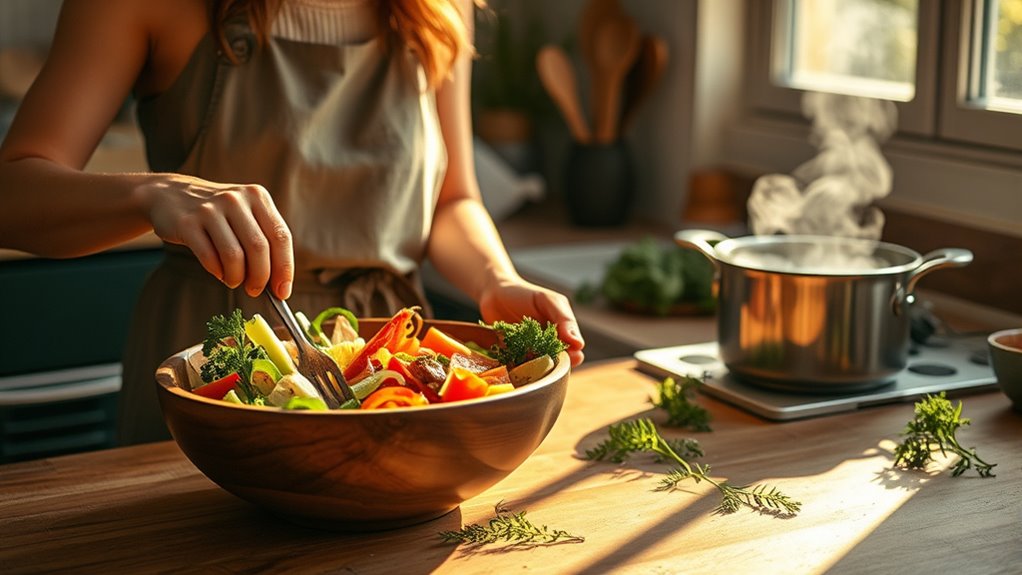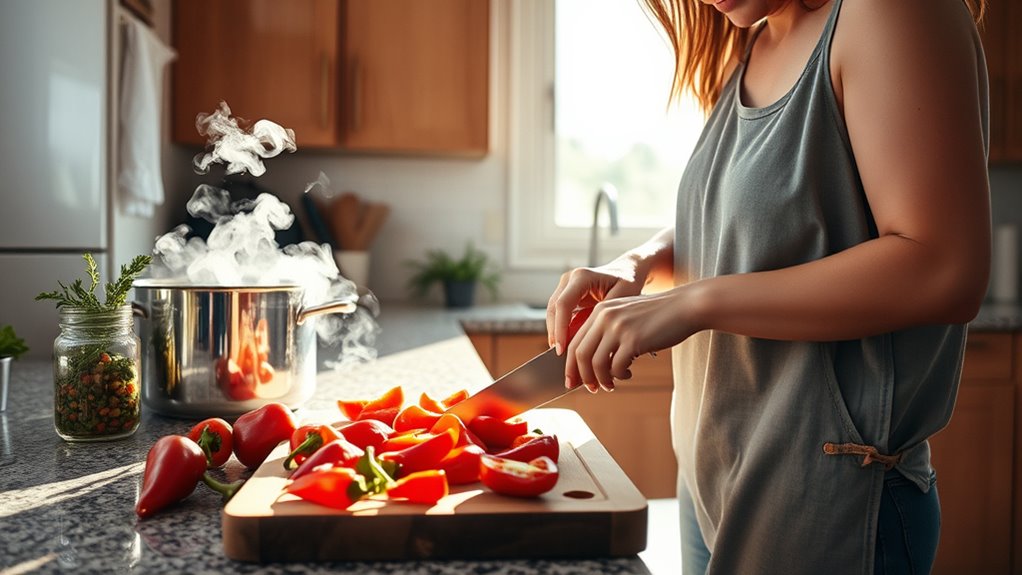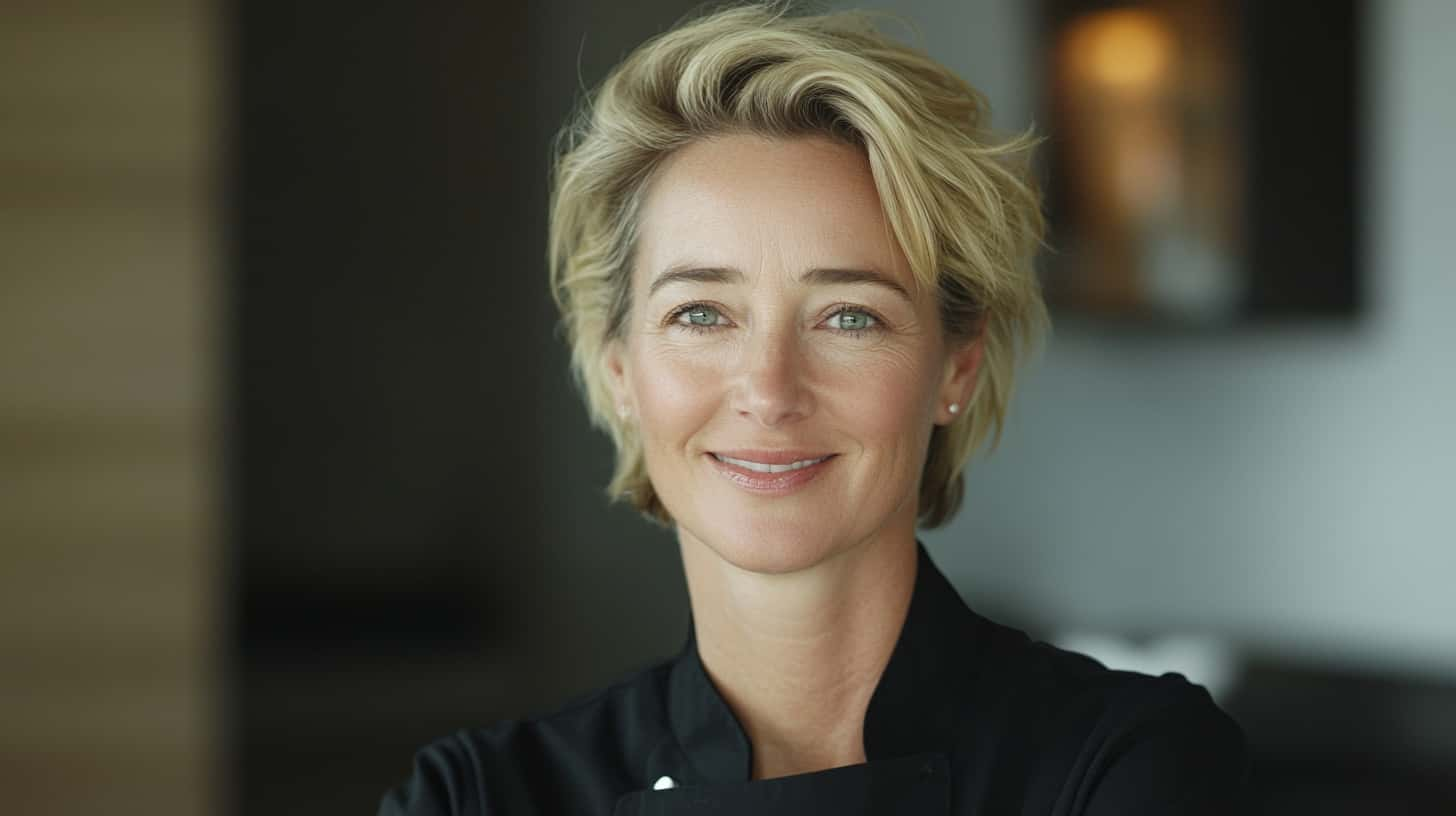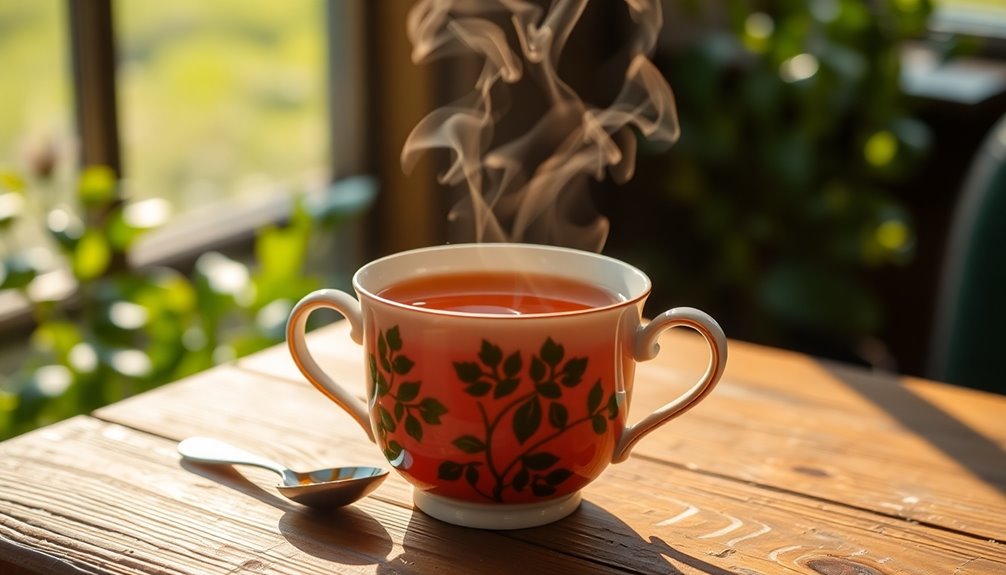Cooking transforms from a routine task into a therapeutic activity when approached mindfully. By focusing on the sensations, smells, and textures, you can quiet racing thoughts and reduce stress. Turning your kitchen into a space for intentional presence helps you relax and find peace amid chaos. Savoring each step fosters emotional well-being and a healthier relationship with food. If you explore this further, you’ll discover simple ways to make your kitchen a true sanctuary for stress relief.
Key Takeaways
- Cooking fosters mindfulness, helping to calm racing thoughts and reduce anxiety through focused, intentional activity.
- Engaging senses during cooking transforms the process into a meditative experience that promotes emotional well-being.
- Practicing mindful eating enhances awareness of food, encouraging a positive relationship with nourishment and reducing guilt.
- Simplifying recipes and setting intentions in the kitchen decrease overwhelm, making cooking a relaxing self-care ritual.
- The sensory and emotional engagement in cooking creates a therapeutic space for emotional healing and stress relief.

Cooking can be a powerful form of therapy, offering more than just a way to prepare meals. When you approach the kitchen with intention, it becomes a space for mindfulness and emotional release. One of the key practices you can incorporate is mindful eating, which means paying close attention to every aspect of your food and the act of eating. When you cook with mindfulness, you’re fully present—focusing on the textures, smells, colors, and tastes of your ingredients. This focus helps quiet racing thoughts and reduces anxiety, turning cooking into a calming ritual rather than a chore.
Culinary mindfulness encourages you to slow down and savor each step of the process. As you chop vegetables or stir a sauce, you become more aware of your senses and your surroundings. This heightened awareness can ground you in the present moment, pulling your mind away from worries or stressful thoughts. By engaging fully with your cooking, you create a meditative experience that promotes emotional well-being. It’s not about perfection; it’s about connecting with what you’re doing and appreciating the process itself.
Using culinary mindfulness can also help you develop a healthier relationship with food. Instead of rushing through meal prep or mindlessly snacking, you learn to listen to your body’s cues and truly enjoy what you’re eating. This practice can bring a sense of accomplishment and satisfaction, boosting your mood and reducing feelings of guilt or shame often associated with food. Over time, this mindful approach to cooking and eating can foster a more positive outlook and lessen the impact of stress.
In addition to mental benefits, focusing on culinary mindfulness can make cooking more enjoyable and less overwhelming. When you prioritize being present, you’re less likely to feel rushed or frustrated. Even simple recipes become opportunities for self-care. You can set an intention before starting—perhaps to relax or to nourish your body—and let that guide your experience. As you engage with your ingredients and the cooking process, you may notice a decrease in stress levels and a boost in overall well-being.
Practicing mindfulness in the kitchen can also enhance your sensory awareness, making cooking a rich and immersive experience. This heightened sensory engagement can turn routine meal prep into a form of self-care and emotional healing. Ultimately, incorporating mindful eating and culinary mindfulness into your cooking routine transforms it from a mundane task into a therapeutic practice. It allows you to carve out moments of peace amidst chaos and reconnect with yourself through the act of creating nourishing food. When you treat cooking as a mindful ritual, it becomes a powerful tool for stress relief and emotional healing.

Cuisinart Chef’s Classic 11-Piece Stainless Steel Cookware Set, Pots and Pans Cooking Set with Aluminum Encapsulated Base to Heat Quickly and Evenly, Cool Grip Handles, Dishwasher Safe, 77-11G
KITCHEN COOKWARE SET: This Cuisinart stainless steel cookware set includes 1.5 qt. & 2.5 qt. saucepans w/glass covers,...
As an affiliate, we earn on qualifying purchases.
Frequently Asked Questions
Can Cooking Improve Mental Health Long-Term?
You might wonder if cooking can improve your mental health long-term. Engaging in mindful cooking practices helps you stay present, reducing anxiety. It also allows emotional expression through creativity and nurturing actions. Over time, these activities can boost your resilience, promote positive habits, and foster a sense of accomplishment. So, yes, regular cooking can support your mental well-being by integrating mindfulness and emotional expression into your routine.
What Are Beginner-Friendly Recipes for Stress Relief?
They say, “A journey of a thousand miles begins with a single step,” and that’s true in cooking too. As a beginner, try making simple salads with fresh veggies or comforting soups like chicken noodle. These recipes are easy, quick, and help you focus on the present. Cooking these stress-relieving dishes can bring calm and satisfaction, making your kitchen a safe space to unwind and find peace.
How Does Cooking Compare to Other Relaxation Techniques?
Compared to other relaxation techniques like mindfulness practices or aromatherapy, cooking engages your senses and keeps you actively involved, which can be more effective for stress relief. While mindfulness helps you stay present, cooking adds a creative, tactile element that distracts from worries. Combining cooking with mindfulness techniques or aromatherapy practices enhances relaxation, making it a versatile and enjoyable way to reduce stress and improve your overall well-being.
Are There Specific Ingredients That Enhance Calming Effects?
You might find that certain ingredients boost your calming effects. Herbal infusions like chamomile or lavender can soothe your mind, while aromatherapy oils such as lavender or bergamot add a relaxing aroma to your space. Incorporating these into your cooking or using them in diffusers creates a peaceful environment, helping you unwind. Experiment with these calming ingredients to enhance your stress relief routine and enjoy a more relaxed state of mind.
Can Involving Others Amplify the Therapeutic Benefits?
Ever wondered if sharing a meal could boost your mood? Involving others in group cooking or family bonding definitely amplifies therapeutic benefits. When you cook with loved ones, you foster connection, reduce loneliness, and create shared experiences that elevate your sense of calm. This collaborative effort transforms cooking from a solitary task into a joyful, stress-relieving activity, making the kitchen a true sanctuary for emotional well-being.

Calphalon Classic Stainless Steel Cookware Set, 10-Piece, Impact-Bonded Aluminum Base, Stay-Cool Handles, Oven Safe 450F, Silver
Impact-bonded aluminum base distributes heat evenly, for exceptional browning, searing, and sauteing
As an affiliate, we earn on qualifying purchases.
Conclusion
As you chop vegetables and stir sauces, it’s like your worries melt away, blending into the rhythm of your cooking. The kitchen becomes a sanctuary where stress dissolves with each step, much like the steam rising from a warm bowl. Suddenly, the simple act of preparing a meal feels like a gentle therapy session, reminding you that even small acts of creation can bring peace. In those moments, you realize the kitchen isn’t just for cooking—it’s for healing.

3 Ply Stainless Steel 11-Piece Cookware Set with Lids, Pots and Pans Kitchen Set, Non-Toxic, Induction, Oven, Dishwasher Safe, Professional Chef Quality
SET INCLUDES: The 3 Ply 11 Piece Stainless Steel Cooking Set comes with tempered glass lids with wide...
As an affiliate, we earn on qualifying purchases.

Stainless Steel Cookware Set,Tir-Ply Pots and Pans Set,10 Pcs Stainless Steel Induction Kitchen Cookware Sets,PFOA Free, Frying Pans, Butter warmer,Saute Pan & Stock Pot,Compatible with All Cooktops
【TRI-PLY STIANLESS STEEL】 Tri-Ply 10-Piece Stainless Steel Cookware Set Includes :8 inch Frying Pan, 10 inch Frying Pan,...
As an affiliate, we earn on qualifying purchases.










